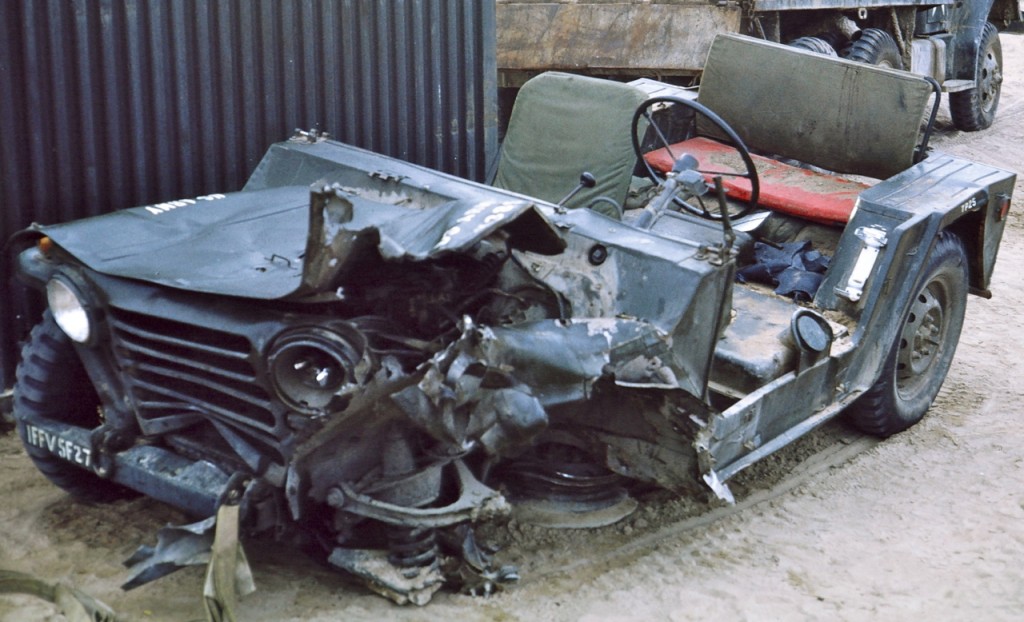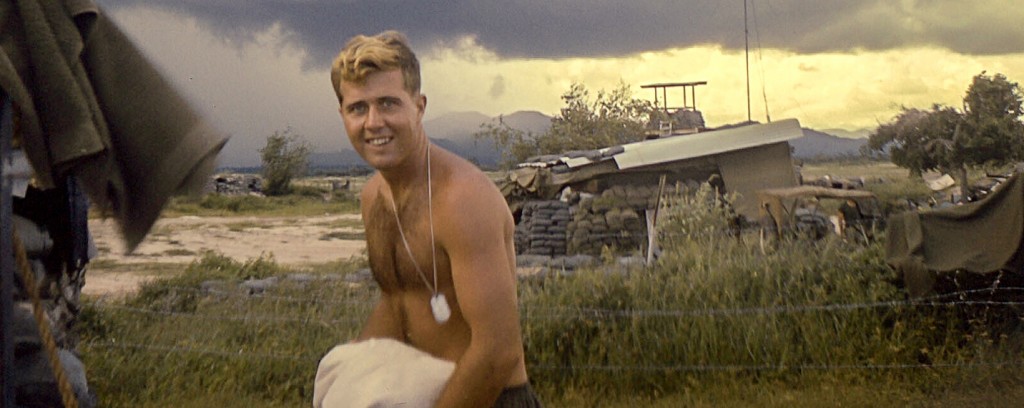The Second Enemy
One night, with just a few days left on my tour, I was on guard duty in that tower near the main gate facing toward Titty Mountain. It was really dark that night. I think you remember when there was no moon in Vietnam, it was really dark, so dark the starlight scope in the tower was useless. We knew there was a possibility that the enemy might use CS gas on us because a Chinook carrying CS gas barrels due to engine problems had to drop its load. It was never recovered, and we were told to keep our gas masks handy.
CS is military grade tear gas. It burns the eyes and skin, causing its victims to shut their eyes involuntarily, vomit and fall prostrate to the ground with violent coughing, mucus discharge from the nose, disorientation, dizziness and trouble breathing.
That night, I thought I saw movement by the main gate. I called it in and was told that I couldn’t shoot because there was an ARVN unit on patrol in that direction. I kind of kept an eye on that area until I got off guard duty. I was back in my hooch when the thing went off. Someone yelled GAS when at the same time mortars started coming in.
Many thought the gas explosion and mortars were the beginning of a ground attack, picked up from stories about other firebase attacks. This night however, with illumination rounds now in the air and perimeter weapons lighting up the area with tracer rounds, that’s all the enemy had to offer, more of a tease and a harassment than a serious attack.
Captain Chuck Heindrichs, then battery commander, says of the incident, “The barrel to my recollection was set off outside the last row of concertina which would have been in the 100 yard range. The biggest impact was on the northwest of Sherry as we had a great concern for the old grandmother and the two kids in that area north of the FDC and without gas masks. Of course, after floundering around by almost everyone trying to find or dig out the gas masks, the gas had dispersed and only a few actually found and ‘donned’ their mask.”
By LZ Sherry standards this was a minor incident, but enough for a flattering mention in The Artillery Review, a newsletter published by First Field Force out of Nha Trang, dated April 17, 1970. The article also gave a nice nod to the amount of artillery fire coming from Sherry compared to the rest of II Corps (Central Highlands).
The VC had rolled the CS gas barrels up near the main gate under the nose of an M-60 machine gun, a testament to their ingenuity, and proof of how dark Vietnam got that they remained invisible in front of an alert guard tower. On nights like that the dark was the second enemy.
Short Timer Crazy
Leaving Vietnam I had to turn in most of my equipment at Phan Rang. I remember when we got down to Tan Son Nhut Airbase outside Saigon how vulnerable I felt because I did not have a steel pot helmet, or flack vest, or M-16, and did not have sandbags over my head like I was used to at Sherry. I felt out of control, scared shitless, and absolutely paranoid. I did not sleep. Instead I sat up outside the barracks because it gave me more options in case of an attack. At Sherry when we got hit you could judge the pattern of the mortars as they walked across the battery one after another. When the first one would hit and then the second one, you got an idea of where the next one would be. I was used to that.
Little Things Take You Back
When I came home I struggled with fireworks. It was not the sound of the fireworks exploding, it was the thud when they went up that sounded just like a mortar round being fired from its tube. Most of the time when we got mortared we heard the thud when they were heading in our direction and well before they landed. You’d yell INCOMING and then if it was after dark you’d start shooting up the illumination rounds. That noise just told me I might get killed. I struggled with that for many years, and for years I never went to the fireworks display in our town. Now fortunately I don’t have an issue and I go with my grandchildren, but I think about it every time.
The same thing with helicopters. When I hear a helicopter flying by I equate that with a Medevac. I live in a small town and the hospital’s not that far from where I live, and most of the helicopters I hear are Medevacs. The sound has not changed over the years.
And certain songs, especially the one that starts with “Give me a ticket for an aeroplane.”
The Letter – released in 1967 by The Box Tops
#1 on The Billboard Rankings
Lead singer Alex Chilton was just 16 years old
Lyrics
Gimme a ticket for an aeroplane
Ain’t got time to take a fast train
Lonely days are gone, I’m a-goin’ home
My baby just-a wrote me a letter
The reason that stands out for me is I just wanted to get on that airplane and get back home. I’m not sure how high a quality a soldier I was because of my motivation. I did my Army job through a sense of duty to the guys with whom I served. I hated the Army; I hated every minute of it. In a letter to my parents after I made the rank of sergeant I said I couldn’t wait for my next promotion – to that of Civilian.

